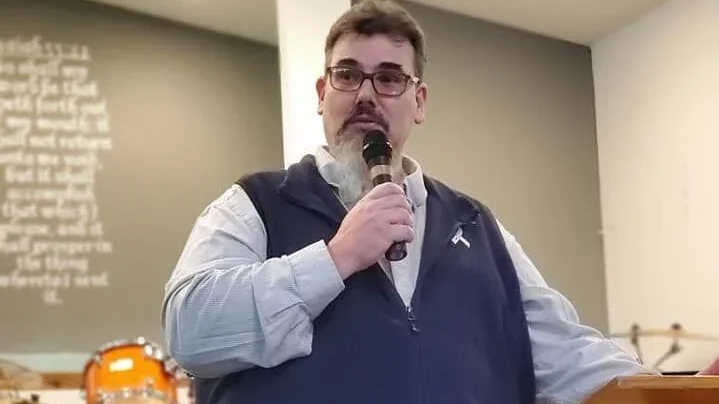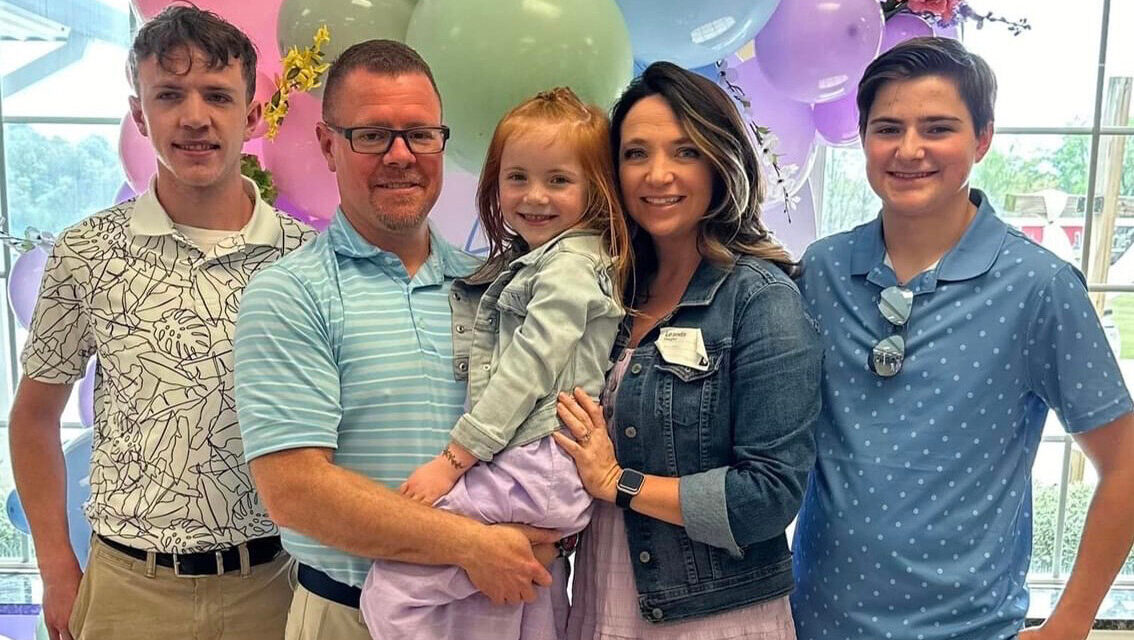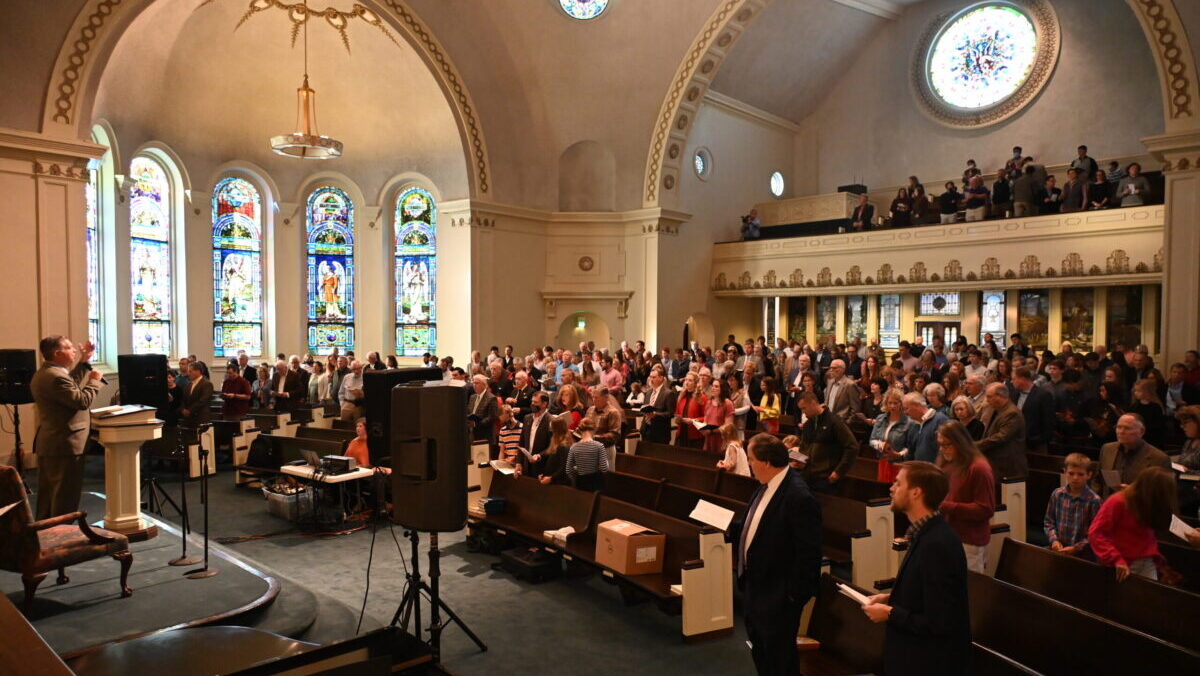Todd Latham, a bivocational pastor in southwestern Kentucky, preaches regularly to mostly unsaved and unchurched people. Some have not only never opened a Bible but they have never heard of it.
The pastor of Grace Baptist Church in Russellville is also the CEO of Grace Recovery Home, and many of those attending his church are residents from the rehab and their families.
“The majority of them have never stepped foot in a church,” Latham said. “We teach them scripture and get them familiar with the Bible. They come here and a lot of them don’t know what a Bible is. You tell them to turn to Genesis; they don’t know what Genesis is.”
He knows addiction
But they do know addiction and so does Latham, who had his life turned upside down when he became hooked on pills in an innocent way more than 10 years ago.
Latham never saw it coming. He was successful and living the good life. He was married with four children, holding a six-figure income with a Hopkinsville manufacturer, attending Bible college and serving as a bivocational pastor for a local church. He had a big home and seven vehicles.
Life was good. And then, in what seemed like the blink of an eye, it wasn’t.
“I handled customer complaints and was a quality technician,” he said. “One day out on the floor of the plant, I reached over a skid, moving boxes, and pulled something in my back. I couldn’t bend over after that.”
He went to the doctor, where he said the office was “standing room only,” and the physician wrote him a script for pain pills. Latham came back several more months for more pills until one visit the doctor said no more.
“The doctor never saw me for more than five minutes,” he said. “The last time I went, he said, ‘Well, I don’t think you need more of these. I think you’re fine.’ And he cut me off.”
Under the surface
Latham wasn’t done with the pills. He found other ways to purchase them and said he was taking 40 Loritabs a day, at a cost of $400–500 a day.
“During this whole time, I’m a bivocational pastor with four kids and enrolled in Bible college. I’m not the drug addict living under a bridge,” he noted. “It looked like I had the ideal life. This went on for five years. I couldn’t function without it. I got tired of the chase. When I got hooked on drugs, I didn’t know you could get help.”
But Latham knew he couldn’t live the life anymore.
So, he put a gun in the car, drove to the middle of a field and planned to end it. “Nobody knew I was hooked on drugs. I was holding down a job, paying my bills, going to school and making good grades, standing up in the pulpit preaching every Sunday,” he said. “I knew the life I was portraying was not what was going on inside of me. I knew it was going to catch up. I was going to kill myself.”
But the thought of his children growing up without a father kept him from pulling the trigger. He went home and told his wife, who had no idea what was happening with him. “I was wearing Fentanyl patches,” he said. “Addiction takes you to a place you thought you’d never go.”
His wife called around and find a place for him to detox although he said it took multiple tries. “I was a full-blown addict. I went to four different detox centers and walked out of a long-term rehab,” he said.
Clean and sober
Eventually, he tried Alcoholics Anonymous and got a sponsor and began to listen to the sponsor and take suggestions. “That’s how I got clean and sober. If it wasn’t for God in my life, I wouldn’t be clean and sober today.”
He said as a young man in his 20s, he had a problem with alcohol and asked God to take it away from him. “He did and it was overnight. When I was in rehab, I asked God ‘Why can’t you take this away from me like you did the alcohol?’ I had to go through the process and it was a process that taught me how to teach others.”
During the two years it took him to recover, Latham lost nearly everything he had accumulated in life, including being the pastor of Grace Baptist, his home, seven vehicles and most of his money. Latham said he and his wife were homeless for 10 months and slept in a tent. His kids stayed with aunts and uncles. Eventually they moved in with his wife’s parents for four or five months.
Rebuilding his life
Slowly but surely, though, he was getting his life back together.
During that time of rebuilding, he told his wife he wanted to go back to church at Grace.
“I called one of the deacons and asked if I could come back to church. I told him I’m not coming for anything other than to sit in a pew, get a word and go home. I need to get connected with other believers.”
His family came back for several month of Sundays and one Saturday around noon he received a call from one of the deacons.
“The deacon said the individual that was coming to preach Sunday had a family emergency and he asked me to preach,” Latham said. “I told him to let me pray and later told him I would. I preached that one Sunday and he asked me again to preach. A few weeks later they asked me to be their pastor.”
Grace was living up to its name, calling the former addict to be its pastor again.
Latham said some members didn’t agree with the decision and eventually left over it. The toll of what had happened through drug use was taking a toll on his health and doctors told him he needed time off. He told the deacons he needed to be off for a couple of months. They agreed and rumors started that he was back on drugs. The church dropped from 65 to 15 members and half of those were children, Latham said.
Meanwhile, he saw God moving in his life and his role as pastor. He was led to develop a Christian rehabilitation program, fully understanding the need in the community after watching his own life spiral out of control. It started small but grew quickly and God continued to bless.
Latham set it up through the small church and Grace Recovery operates five to seven treatment homes that care for 75-100 addicts at a time in the year-long program. The Kentucky Baptist church averages about 200 people a Sunday with 150 of them being recovering addicts in the program and their family members. It is essentially a church of 50 running a huge recovery program.
“This is what I’m hearing from the members: They see people’s lives changed on a weekly basis. Instead of seeing God move a couple of times a year, we see God move every week,” Latham said.
Opened doors
God also continually opened doors for the rehab homes and provided spaces for Grace Recovery in miraculous ways as he set up the now thriving program. It hasn’t always been easy with neighborhood groups fighting him over placing residential homes.
Grace Recovery House helps with counseling of all kinds, and when specific types of counseling are needed that the recovery house is not certified in, Latham said they will help get you to the place you can go to get the counseling you need. They help get you to doctor appointments, get you set up with insurance, an ID, and a birth certificate, get a job and teach you how to budget money.
“One of the conversations I was having with staff was about starting a podcast to educate people about recovery,” Latham said. “There’s a big disconnect to what addicts are going through.”
EDITOR’S NOTE — This story was written by Mark Maynard and originally published by Kentucky Today, news service of the Kentucky Baptist Convention.








